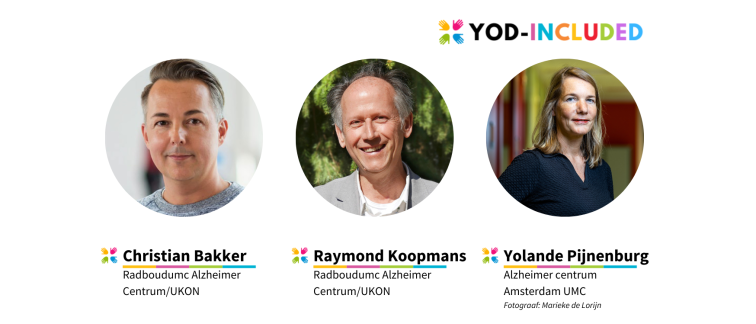Both Alzheimer's dementia and frontotemporal dementia are known to have significant hereditary risk. However, much of the hereditary risk of dementia is still misunderstood. This is where YOD-INCLUDED will be doing further research. This consortium is also investigating how to ensure that people with symptoms of dementia other than deterioration of memory and change in behavior, for example, get a quicker and better diagnosis.
Including patients, loved ones, and broad diversity
For this purpose, a group of about 1,000 people will be followed over the next four years. This group forms the backbone of the study and is unique in the world in terms of its size and design. YOD-INCLUDED involves experts by experience in all phases of the research, they include as many people with young-onset dementia and their loved ones as possible and seek broad diversity in terms of level of education, socioeconomic status, and migration background.
Setting the course
The person with dementia and their loved ones are put at the wheel of the study and decide for themselves which components they will participate in and for how long. Together, they are going to identify how to provide better care and support in early-onset dementia from a family- and person-centered approach. In addition, they will also address care and support at different stages of the disease process.
National collaboration
The YOD-INCLUDED (Young Onset Dementia-INCLUDED) consortium is a large national collaboration. The consortium is led by the Radboudumc Alzheimer Center, UKON (Prof. Dr. Raymond Koopmans and Dr. Christian Bakker) and the Alzheimer Center Amsterdam UMC (Prof. Dr. Yolande Pijnenburg). Additionally, Alzheimer Nederland, FTD-lotgenoten, the Knowledge Center Dementia at Young Age, Vilans, Hogeschool Leiden, Erasmus University and the Alzheimer Centers of Limburg, UMCG and Erasmus MC are part of this consortium.
National Dementia Strategy
As part of the National Dementia Strategy 2021-2030, the Dutch Ministry of Health, Welfare and Sport has recommended to intensify research efforts, with attention for the causes of dementia, diagnosis, early onset dementia, prevention, and innovative treatments of dementia. TAP-dementia is one of the consortia launched under the umbrella of the National Dementia Strategy, as part of Dementia Research Program from the The Netherlands Organisation for Health Research and Development (ZonMW).

